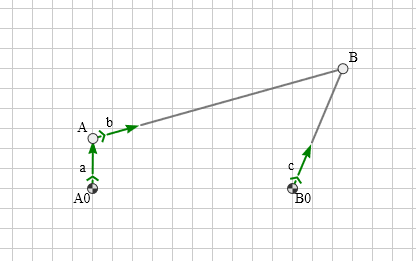mec2 #
mec2 is a javascript library for simulating and analysing planar mechanisms or linkages. The concept is based on nodes constrained by one of four different vectors. Solving the kinematic equations is done by using Erin Catto's principle of sequential impulses, often used by gaming physics engines.
Its API is minimal and easy to understand. The library is tiny and fast. Mechanisms are described using an easy to read JSON format.
Example #

JSON #
{
"id":"4bar",
"nodes": [
{ "id":"A0","x":100,"y":100,"base":true },
{ "id":"A", "x":100,"y":150 },
{ "id":"B", "x":350,"y":220 },
{ "id":"B0","x":300,"y":100,"base":true }
],
"constraints": [
{ "id":"a","p1":"A0","p2":"A","len":{ "type":"const" } },
{ "id":"b","p1":"A", "p2":"B","len":{ "type":"const" } },
{ "id":"c","p1":"B0","p2":"B","len":{ "type":"const" } }
]
}
How do I use it? #
You can build an environment yourself.
Here's a minimal example:
<html>
<head>
<title>minimal mec2 example</title>
<meta charset='utf-8'>
</head>
<body>
<canvas id="c" width="601" height="401"></canvas>
<script src="https://gitcdn.xyz/repo/goessner/g2/master/src/g2.js"></script>
<script src="https://gitcdn.xyz/repo/goessner/mec2/master/mec2.min.js"></script>
<script>
const ctx = document.getElementById('c').getContext('2d'); // the canvas-context
let g = g2().clr().view({cartesian:true}).grid(), // a g2 graphics-object
model = { // your model
id: 'pendulum',
gravity:true,
nodes: [
{id:'A0',x:300,y:240,base:true},
{id:'A1',x:380,y:300}
],
constraints: [
{ id:'a',p1:'A0',p2:'A1',len:{type:'const'} }
]
};
// simulation
const simulate = () => {
model.tick(1/60); // solve model with fixed stepping
g.exe(ctx); // render its pose on the canvas
requestAnimationFrame(simulate); // keep calling back
};
mec.model.extend(model); // extend the model
model.init(); // initialize it
model.draw(g); // append model-graphics to graphics-obj
simulate(); // kick-off the simulation
</script>
</body>
</html>
If you don't want to do that, check out the project mecEdit. mecEdit is a standalone, installable editor for planar mechanisms, that uses mec2 as a physics engine and focuses on user experience. It's hosted here.
License #
mec2 is licensed under the terms of the MIT License.